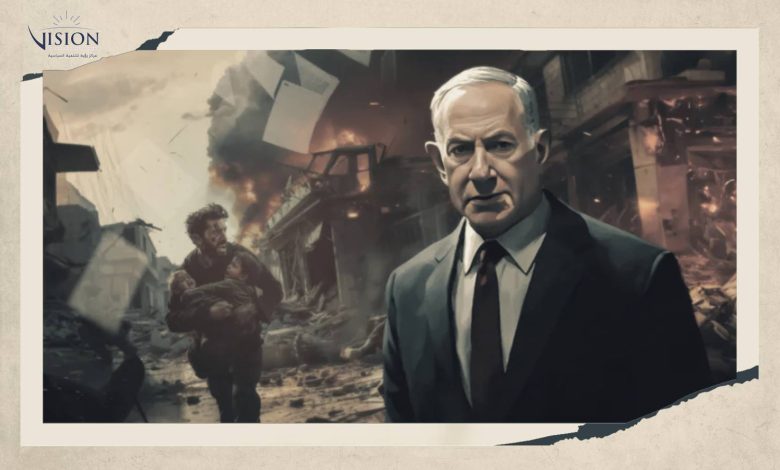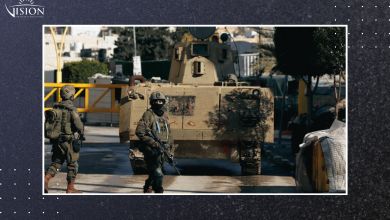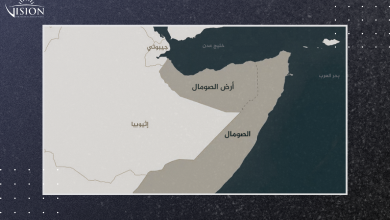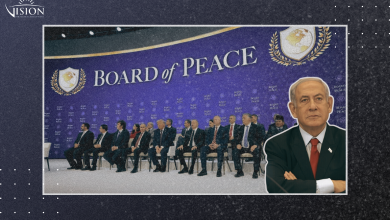Is Netanyahu Truly Prolonging the War on Gaza?

Ahmed Atawna / Al Jazeera
A substantial number of analysts and observers contend that Benjamin Netanyahu’s obstinacy regarding a ceasefire, which could lead to an end to the war in Gaza, stems from his fears about his political future. They posit that ending the war would precipitate the collapse of his government and compel him to confront the substantial failure of October 7th.
Although this interpretation appears to be partly objective, it falls short of comprehensively explaining why the war persists. For months, the conflict has become militarily futile, characterized mainly by senseless killing and destruction, egregious violations of international laws and norms, and blatant disregard for all international resolutions issued by the United Nations Security Council, the United Nations, and international courts, all calling for an immediate cessation of the genocide against the Palestinian people.
Netanyahu is Not “Samson”
Netanyahu has endeavored to extend the war’s duration to portray himself to the far-right as an exceptional Prime Minister, a leader with unmatched capabilities, akin to a “mighty Samson,” capable of confronting Israeli opposition, the military, security forces, the UN Security Council, international courts, and the stances of Western and Eastern nations advocating for an end to the war and the ongoing massacre of Palestinian civilians.
This perspective presumes that all these entities are earnest and sincere in their efforts to halt the war, and that Netanyahu alone is obstructing peace, endowed with the requisite capabilities and skills. This presumption is not only exaggerated but also detached from reality.
A Supportive, Not Pressuring, Political Environment
An in-depth analysis of the internal, regional, and international political landscape reveals that Netanyahu is not subject to genuine pressure to cease the war. He does not perceive any real threat from capable entities, except for the internal front within Israel. On the contrary, the majority of these entities have continuously provided the necessary support for the war’s perpetuation. A succinct overview demonstrates that:
The internal Israeli environment remains insufficiently pressuring to halt the war. Netanyahu maintains control over a stable governmental coalition, bolstered by a solid majority of 64 seats in the Knesset. The military and security institutions continue to operate under government directives and comply with its orders, notwithstanding the substantial damage inflicted by the resistance. The opposition is fragmented, disorganized, and lacks a unified stance on specific objectives, rendering it ineffective and incapable of influencing Netanyahu’s strategies and policies. The Zionist public’s pressure—whether to negotiate a prisoner exchange deal involving a ceasefire and withdrawal from Gaza—remains minimal and has not garnered the necessary momentum to compel Netanyahu and his government to respond to its demands thus far.
Indeed, on several occasions, Netanyahu has pitted the public against itself, creating a divide between supporters and opponents of his government, effectively fostering a ‘public versus public’ scenario. This confluence of factors has ensured that, up until the time of writing, Netanyahu perceives no real threat to the stability of his government. Unless there are significant and effective changes within these elements and actors, Netanyahu is unlikely to alter his stance or behavior.
The United States has been a full partner in the aggression against our people in Gaza from the very first day. Although some discrepancies have emerged between the positions of the U.S. state institutions and the Democratic administration, particularly regarding the ceasefire and prisoner exchanges, the unwavering support and comprehensive partnership in military, security, and political terms remain constant. This unwavering support reassures Netanyahu, guaranteeing the continuity of his actions under all circumstances. He relies on the support of military, security, and economic institutions, and pro-Israel lobbies, with AIPAC at the forefront.
Moreover, influential Christian Zionist institutions and leaders, estimated to have around 70 million followers in the U.S., along with key figures in the current White House administration, such as Secretary of State Blinken and National Security Advisor Sullivan, further bolster Netanyahu’s position.
Most crucially, Netanyahu and the far-right parties in Israel have their eyes set on the upcoming U.S. elections at the end of the year, anticipating the potential return of Donald Trump as President. Trump is known for his uncritical support of Israel and his radical plan to resolve the Palestinian issue, famously termed the ‘Deal of the Century.’
Central and influential European countries, particularly Germany, Britain, and France, have maintained their longstanding policies regarding the Palestinian issue. For decades, in both war and peace, they have followed the lead of U.S. policy and served its interests. Despite significant public pressure in several European countries and various political statements and positions, these have not translated into impactful political action. Support for Israel and its reckless war continues unabated.
The Arab and Islamic world has, during this war, reaffirmed its impotence, weakness, and marginalization. Some of its parties have exacerbated the situation through their stances on the war and their political and media performances during the conflict. Arms deals have been struck, and trade exchanges with Israel have increased among several countries, sending highly negative messages to the Palestinians and providing direct support and backing to the occupation.
Optimism Regarding a Serious Islamic and Arab Stance Did Not Last Long
Following the joint summit of the Organization of Islamic Cooperation (OIC) and the League of Arab States, which established a joint committee of seven foreign ministers, there was initial optimism. Many believed that this step would result in significant diplomatic efforts and Arab and Islamic pressure, leading to support for the Palestinians. Unfortunately, the disappointment was as great as the weight of the summit and its member states. Within a few weeks, the committee and its work had faded into obscurity.
Palestinian Leadership’s Failure
Despite the extraordinary resilience of the Palestinian people and their valiant resistance, the official political leadership—represented by the Palestinian Authority and the PLO—has shown a disconnect from reality, a national schism, political impotence, and a relinquishment of historical responsibility. Their performance has been dismal, to the point of aligning with the occupation and its narrative.
This is compounded by the continued security coordination with the army, which commits daily massacres against its people, women, and children, and the ongoing pursuit of resistance in the West Bank. Resistance fighters face insurmountable challenges in a hostile environment while trying to support Gaza, resulting in the arrest of dozens of young people and the martyrdom of eleven Palestinians at the hands of the Palestinian Authority’s security forces up to the date of this article.
Lack of Popular Palestinian Pressure
Simultaneously, Palestinian popular forces, wherever they exist, have been unable to mobilize the Palestinian masses and organize movements to exert real pressure on Israel and its supporters. The behavior of Palestinians outside the Gaza Strip, like that of the Arab and Islamic peoples, has been characterized by weakness and lack of impact.
Netanyahu Is Not Skilled, but the Political Environment Is Complicit
Given all this, it is essential to consider the influential and pressing factors on Israel with its various components, focus on them, and activate them rather than waiting for a change in Netanyahu’s stance or his retreat under mostly illusory or ineffective pressures.
Netanyahu and his state are too weak to withstand serious pressure from any regional or international parties if there were sufficient will. Most of these parties possess the capability and tools to curb this aggression. Unfortunately, some of these parties, particularly the United States, are aligned with Israel and its objectives, differing only in some issues related to managing the conflict. Others are indifferent and hypocritical, continuing to speak about values, human rights, and solidarity with victims while still supporting the perpetrator, as evidenced by influential European countries.
Meanwhile, the “official” Arab and Islamic world remains mostly fragmented, weak, and submissive to American dominance. It appears incapable of seizing a historic moment in which the world is moving toward change, presenting an opportunity that may not recur to break free from American hegemony and confront the Zionist project, which has threatened—and continues to threaten—the interests of these states, while also stripping Palestinians of their homeland and rights.





